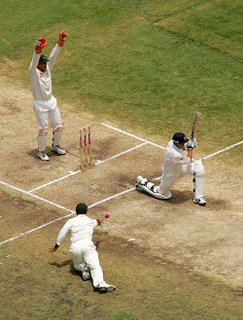An attempted sweep by Geraint Jones made no contact. The ball rebounded off his pad and Shane Warne (aided by team-mates) launched into an enthusiastic appeal for LBW. While all this was going on, Ricky Ponting scooped the ball in the direction of the stumps. Jones, seemingly paralysed by the fear that the umpire's decision would extend his series of low scores, had not regained his ground. The result? LBW appeal - not out. Run out appeal - OUT!

It's moments like these that see Australia winning the series quite comprehensively. Whether taking crucial catches rather than dropping them, or reacting to momentary chances, the key to Australia's success is being on-the-ball and taking opportunities. It's not as if England don't know the rules - Australia are just more "keyed in".
Chatting with a friend about Jesus's "Love one another" statements, my friend commented that it's not exactly rocket science. I kind of agreed. With the exception of incredibly selfish individual, most people can grasp the concept of loving one's fellow human beings - after all it's simpler than the rules of cricket ;)
But it's putting it all into action that is the key. Just as in cricket, the challenge is to be alert - see the opportunities - and make a difference.
